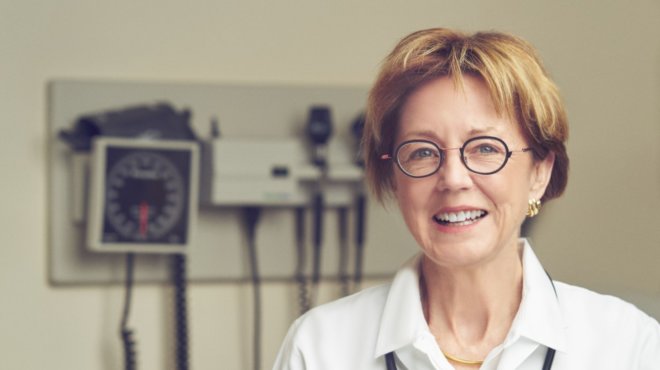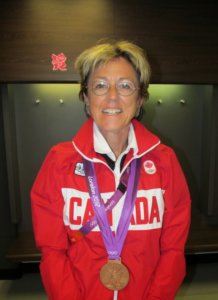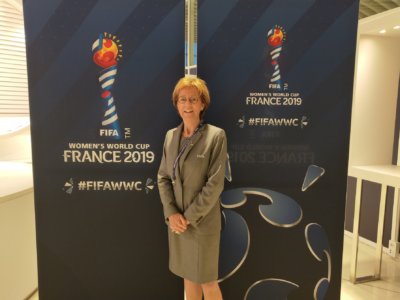
Trailblazing sports medicine leader Dr. Cathy Campbell steps into a new role
By Lola Augustine Brown
Since being a varsity track athlete and Physical Education student at Dal in the 1970s, Dr. Cathy Campbell has been channeling her indomitable spirit to propel herself and other athletes forward. She’s held leadership roles in some of the world’s biggest sports arenas — including the Olympics and FIFA World Cup matches. Her latest challenge has been assuming presidency at the Canadian Academy of Sport and Exercise Medicine (CASEM). Her success, she says, is rooted in her ability to get along with pretty much anybody and says it comes from her Nova Scotia roots.
With an impactful career that spans more than four decades, it’s hard to know how to catalogue Dr. Cathy (CJ) Campbell’s (BPE’75, MSc’77) list of achievements.
Most recently, Campbell was elected president of the Canadian Academy of Sport and Exercise Medicine (CASEM). In 2014, Campbell was inducted into the Nova Scotia Sports Hall of Fame. She has held several roles supporting Canada’s Olympic athletes, and with FIFA, where she has worked at 15 World Cups as a FIFA medical officer and doping control officer or as the Canadian women’s team physician. She has also held the position of CMO or FIFA Chief Medical Officer and doping control officer at several tournaments. No other North American woman has held the CMO position for FIFA.
 When asked about career highlights, Campbell has an amazing story to share from the 2012 London Olympics. She was working with the Canadian women’s soccer team as its High Performance Team leader and team physician as they won bronze. “At that time, it was the first medal that Canada had won in the Summer Olympics for a team sport since the Canadian men’s basketball won a silver medal in 1928. That was an incredible moment,” Campbell says.
When asked about career highlights, Campbell has an amazing story to share from the 2012 London Olympics. She was working with the Canadian women’s soccer team as its High Performance Team leader and team physician as they won bronze. “At that time, it was the first medal that Canada had won in the Summer Olympics for a team sport since the Canadian men’s basketball won a silver medal in 1928. That was an incredible moment,” Campbell says.
There’s more to the story though. Campbell’s niece, Missy Franklin, was also at the London Olympics, swimming on Team USA. “We started our (women’s soccer) team meeting before the finals by watching her first race, the 100 m backstroke. I could barely breathe, and I’m watching my sister and brother-in-law in the stands, and we watched my niece win gold,” Campbell explains. “I think that helped inspire the (soccer) team, like ‘Jeez, if old doc’s niece can win a gold medal, why can’t we win a medal?’ ”
An unexpected career trajectory
Campbell graduated from Dal with a Bachelor of Physical Education in 1975, followed by a MSc in exercise physiology in 1977.
“To be honest, I had kind of a dysfunctional childhood. I went into phys ed because I’d won the 200 m track provincials so it made sense to me,” Campbell says. “I’d always been an average student until then, my sister and I lived in many different places and my studies were not my priority, but the phys ed program was so incredible—that’s why I give donations to Dal and have started a scholarship [the Dr. Cathy J. Campbell Track and Field Scholarships]—and I had incredible professors. It was the perfect situation for a misguided kid who needed a little direction.” She was also grateful for “Aunt Bee and Aunt Mary” who were senior citizens and distantly connected, who always helped out providing sage advice through large chunks of her life. And she says that her sister, who was four years older, was her guardian and her hero.
Having mentors segued into her becoming a mentor to others, and while at Dal, Campbell coached many kids and adults and became the head and volunteer coach for the Atlantic Track Club. One of the kids, Cecilia Branch, eventually made the 1980 Olympics but unfortunately it was the boycott year. Because of her coaching successes in Nova Scotia, Campbell received several scholarships related to coaching, enabling her to study and work with the 1976 Olympic coaching team under head coach Gerrard Mach. After graduating, Campbell took a job as a Sport Consultant with the Coaching Association of Canada in Ottawa.
Then, Campbell decided to follow in the footsteps of her sister and go into medicine, starting at McMaster University in 1980. Her career in sports and family medicine took her first to British Columbia, Connecticut, Texas, and ultimately back to Canada, but her willingness to seize any opportunity that excited her has taken her all over the world.
Embracing change and challenges
Not surprisingly, Campbell has observed many changes in her long career, especially when it comes to the inclusion of women in sports and places once reserved for men.
 “We didn’t even have women’s soccer when I first started,” she says. Campbell says that she has experienced sexism in her long career, both overt and subtle. “But I don’t get mad. I believe you have to problem-solve in order to get ahead,” she says. She has often been in charge in locations where women do not typically hold senior roles. “I’m often sent to countries by FIFA to make that World Cup [tournament] work, wherever it is being held,” she says, “And what works in my favour is that I’m a friendly Maritimer, and there are very few people that I can’t get along with. I think that’s partly why they send me all these places and I feel that is my greatest asset.”
“We didn’t even have women’s soccer when I first started,” she says. Campbell says that she has experienced sexism in her long career, both overt and subtle. “But I don’t get mad. I believe you have to problem-solve in order to get ahead,” she says. She has often been in charge in locations where women do not typically hold senior roles. “I’m often sent to countries by FIFA to make that World Cup [tournament] work, wherever it is being held,” she says, “And what works in my favour is that I’m a friendly Maritimer, and there are very few people that I can’t get along with. I think that’s partly why they send me all these places and I feel that is my greatest asset.”
Of her new role as president of CASEM, Campbell says, “It is an incredible opportunity to be a leader in a professional career I’ve spent my life working for, and putting my own little slant on it.” This slant includes increasing membership engagement through introducing town halls and newsletters, and making the organization representative of Canada and its membership.
“One of the recent town hall guests was Dr. Tina Atkinson from Dartmouth (MD‘95), the Team Physician for the Olympic Canadian women’s hockey team, and I bring guests from B.C. and from across Canada onto the Town Hall in order to try and raise the profile of members across the country,” Campbell says, “I live in Ontario now, but as a Nova Scotian I know how important that representation is.”